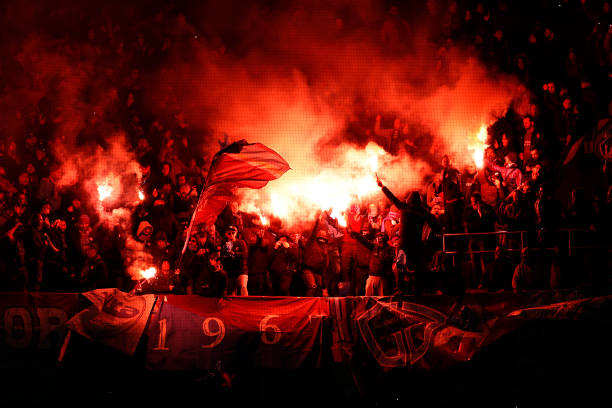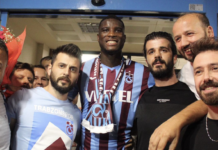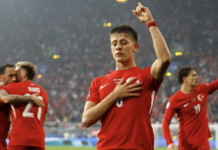
Jaroslav Silhavy’s abrupt departure gave Ivan Hasek limited preparation but the Tomas Soucek-led Czechs will be dangerous
By Martin Vait
This article is part of the Guardian’s Euro 2024 Experts’ Network, a cooperation between some of the best media organisations from the 24 countries who qualified. theguardian.com is running previews from two countries each day in the run-up to the tournament kicking off on 14 June.
Prospects
It was 3am in Olomouc two days before the Czech Republic’s decisive Euro 2024 qualifier against Moldova. The national team assistant manager, Jiri Chytry, had one of his sleepless nights so he went out of his hotel room and roamed the corridors – only to hear some familiar voices. He wasn’t sure who they were but could sense that they had been out.
When the news broke the next morning that Jakub Brabec, Vladimir Coufal and Jan Kuchta (seemingly a rather incompatible trio) had gone partying at a nightclub called Belmondo, which was at the time packed with lower-league players celebrating the end of their autumn season, it was clear that heads would roll. The players were dropped but, after securing qualification for the Euros, the national team coach, Jaroslav Silhavy, left too.
The 62-year-old had done great work during his five years in charge. His side had beaten England and drawn against Belgium and Spain and, most importantly, reached the quarter-finals of the last Euros. However, the playing style had gradually become more and more dour and predictable while his principles had got somewhat lost. Towards the end his squad selections had started to raise eyebrows.
So after Euros qualification he was gone, meaning that his replacement, Ivan Hasek, had only the March international break to have a closer look at the players before the pre-tournament preparations. “We want to be unpredictable before the Euros,” is Hasek’s mantra and that should not be too difficult to achieve considering the circumstances. He is pragmatic at heart (“We can’t play naive football,” he says), but he has surrounded himself with a talented, young coaching staff whose methods are similar to the gegenpressing of many German coaches.
Hasek wants to build on club foundations, from both Slavia and Sparta, which makes sense in theory. But who exactly are these players? Several Slavia players are not in the best form and Sparta’s centre-back partnership is unproven at international level. The starting XI is far from settled and neither is the system. Will it be a three or a four at the back?
This is a team who are perhaps better against stronger opponents, when they can be reactive and cause problems on the counterattack. Against weaker sides, the Czechs often struggle to come up with intricate attacking moves to unlock a low block. Expect a hard-working, defensively cohesive side who will run a lot and will be a force from set pieces – much like many Czech teams of the past.
The coach
What a peculiar footballing life Ivan Hasek has had. He captured the hearts of the country in 1989 when he, as Sparta and Czechoslovakia captain, spoke out during the Velvet Revolution at a packed Wenceslas Square in Prague. Immediately after retirement he led Sparta to back-to-back titles as their coach, won a Champions League group in the 1999-2000 season and was the last Czech manager with a permanent job in one of the top five European leagues, at Strasbourg. It doesn’t stop there though. As a soft-spoken law graduate, he became the most prominent critic of corruption in Czech football before miraculously winning the Czech FA presidency in 2009. During his tenure, he coached the national team for six months before surprisingly leaving the post as president, having decided he could not implement any significant change. He spent another decade coaching in the Middle East and it’s hard to predict how that spell outside of Europe has shaped him as a coach. One thing doesn’t change, though: his love for football. “The weekend is a beautiful thing for me,” Hasek told Denik Sport. “I’m sitting at the TV, flicking from one football game to the other, and just watching them all. Some may say I’m crazy, but I feel great in my armchair.”
The icon
Tomas Soucek or Patrik Schick? Is it the epitome of a professional who does everything well, runs tirelessly and contributes the odd goal? Or the world-class goalscorer who can propel this side to greatness with a moment of genius? By virtue of ubiquitousness it has to be Soucek. He is the captain who knits everything together and sets an example with his positive attitude. A player symbolic of his era. There were others rated more highly by youth coaches but his game intelligence, engine and character have been world class. He’s not the only one like that in the Czech squad. Soucek’s rise to the top is a fairytale for the kids.
One to watch
Oh, how many of those we had. A generational talent who never lives up to the expectations. Were they actually that good in the first place? Are we unable to push their technical abilities further? Or are we burdening them too much from a young age? These are existential and, frankly, endless questions in Czech football with the latest subject being Matej Jurasek, the 20-year-old Slavia winger who has so much potential. He is mesmerising to watch when using his trademark quick footwork to go past a defender and fire off a bullet of a shot into the far corner. Hopefully he will get the chance and freedom to make something special happen.
The maverick
A winning 90th-minute penalty or a sending off for a late tackle? Ladislav Krejci is capable of both. He’s been shown three red cards this season – no player in Europe’s top divisions has had more – but a move to Real Betis or Girona is imminent and he is set to make an impression in Germany. He is a communicative leader with a distinct personality, versatile, and a regular goalscorer. When he is in form and the pressure is on to produce, that’s when he takes charge and produces special moments. And also some shithousery.
The spine
The spine? More like half a spine. The starting XI is hard to predict at the moment but the Slavia goalkeeper Jindrich Stanek and Soucek are two mainstays who will definitely start. You can add Schick to that if he is fit as he has been recently. As for the defence Tomas Holes is the main centre-back and his calmness, experience and confidence on the ball should make him a key player once again.
Celebrity fan
Truth be told, there aren’t many high-profile celebrities you can associate with the national team in the same way as with the club sides. It is testament to how Czech club football has gradually embedded itself into the social fabric of the country in the past few years of fan boom and success in Europe. At Slavia, the cameraman’s lens always turns to Petra Kvitova. Daniel Kretinsky, the billionaire West Ham part-owner, is a big fan of his fully-owned Sparta. The Czech national team fanbase, on the other hand, have a bit of a socks-in-sandals reputation, which is why it was fitting to have celebrity chef Jiri Babica at the recent kit launch. He is someone who embraces his scruffiness and is best summarised in the now immortal line: “If you don’t have lemons, you can use limes. If you don’t have limes, you don’t have to use anything at all.”
Culinary delight
No klobasa (sausage), no party, goes the slogan for the Blansko Klobasa, a lovely group of British-born, Czech-based fans of their adopted local side playing in the third division in a small town near Brno. And there is no proper football game anywhere in the Czech Republic without the smell of freshly cut grass and the iconic smoke from the sausages on the grill. Served on a paper plate with a splash of mustard, a couple of bread slices and, most of all, a pint of a beer in a plastic cup with a nice bit of foam on top, it’s proper Czech cultural heritage.
Czech Republic team guide written by Martin Vait (Denik Sport) for the Guardian’s Experts’ Network










